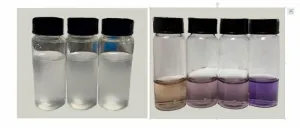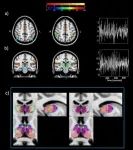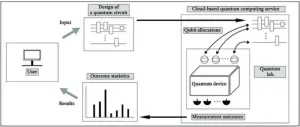(Press-News.org) Like many collectors of L.P. records, James Fitzgerald’s brother-in-law has a favorite store where he consistently finds the best vinyl for his collection. But there are times when he spends hours at the store and comes up empty. He also knows that occasionally he should venture to the record store on the other side of town, where he sometimes scores a hard-to-find gem that was stocked since his last visit.
Fitzgerald’s brother-in-law is making a calculation: weighing probable outcomes to guide his behavior. His favorite record store rewards him more frequently, so he visits that store the most. The second-tier store is less likely to reward him, so he visits that store only occasionally.
Glenn Turner, who like Fitzgerald is a neuroscientist and group leader at HHMI’s Janelia Research Campus, says this “record foraging” habit is a perfect example of a type of behavior called matching that is pervasive in the animal kingdom. Instead of vinyl, non-hipster animals like mice and flies forage for food, using sensory cues like odors to evaluate food quality from a distance.
But, while matching has been observed in everything from pigeons to mice to humans, it was unclear how the brain carried out this value-based decision-making. Researchers had previously proposed a theory for how that might happen, but the idea hadn’t been tested in the real world.
Now, a team of Janelia researchers that includes Fitzgerald, Turner, Janelia Graduate Scholar Adithya Rajagopalan, former Janelia Fellow Ran Darshan and Research Specialist Karen Hibbard has confirmed that the proposed theory works. Rajagopalan’s experiments showed that, like Fitzgerald’s brother-in-law, fruit flies can make decisions based on their expectations about the likelihood of a reward. The team also pinpointed the site in the fly brain where these value adjustments are made, enabling them to directly test this theory on the level of neural circuits.
“We found that flies are using expectation to assign value to their world,” Turner says. “It also really nicely connects back to this theoretical work that was so elegant and explains this widespread phenomenon.”
Uncovering how the fly brain carries out this ubiquitous behavior could help scientists better understand how similar decision-making happens in the brains of larger animals, including humans. Decision-making goes awry in diseases like addiction, so understanding how this process works in simpler brains has broad value, according to the researchers.
“The kinds of ideas and the theoretical framework that we have identified in this paper feel like a seed for evolution to build on in larger organisms, where more layers are added to allow for more complex behaviors,” says Rajagopalan, the first author of a new paper describing the work.
Investigating matching behavior
Fruit flies, whose brains have been well studied and mapped, were an appealing choice for examining matching and its underlying mechanisms. But first, the team had to design a way to observe fruit fly decisions.
Rajagopalan, who came to the Turner Lab through a joint graduate program with Johns Hopkins University, spearheaded the project. He designed an experiment where a single fly enters one arm of a symmetrical Y-shaped arena. Odors are pumped into the other two arms of the Y. The fly chooses to follow one odor or the other and is rewarded – in this case by having its sugar-sensing neurons activated – but with different probabilities: One odor might translate into a reward 80 percent of the time, while the other odor might yield a reward 20 percent of the time.
The researchers found that the fly learned to expect the rewards in the same proportions they were presented and then made its choice based on those expectations. These actions give the matching behavior its name: 80 percent of the time, the fly chose the odor that gives 80 percent of the rewards. And 20 percent of the time, it chose the odor that yields 20 percent of the rewards.
The team tracked the behavior to specific synapses in the mushroom body, a region of the fly brain responsible for learning and memory. This enabled them to create a model of how the brain carries out this behavior, based on the theory of matching. In this theory, the values associated with different choices are learned through changes in synaptic strength: Synaptic connections are strengthened or weakened in proportion to the difference between expected and received reward. The team’s model based on this theory and the fly’s behavior allowed them to demonstrate how individual synapses are changing to enable value-based decision-making.
The new work emphasizes the important interplay between experiment and theory, converging on a description of the rules governing how an animal learns – an outcome that the researchers say is satisfying on both a conceptual and mechanistic level.
“To be able to see that you can get these sophisticated economic decisions through this simple mechanistic explanation about how synapses are changing is a great illustration of what mechanistic cognitive neuroscience can mean,” Fitzgerald says. “We’re taking this universal property and using the strengths of these small animals to really nail it mechanistically.”
END
Fruit flies offer clues to how brains make reward-based decisions
2023-09-22
ELSE PRESS RELEASES FROM THIS DATE:
Pioneering health tracker for stroke survivors will use the body to transmit data
2023-09-22
AMHERST, Mass.—An interdisciplinary team led by University of Massachusetts Amherst researchers has been awarded $1.14 million over four years by the National Institutes of Health (NIH) to develop a revolutionary way of tracking body movements, with a primary application in stroke survivors’ rehabilitation and huge potential for future applications across a wide range of disciplines, health-related and beyond.
More than 795,000 Americans suffer from strokes annually, and nearly 80% of stroke survivors experience some degree ...
Brazilian researchers develop method of purifying water contaminated by glyphosate
2023-09-22
Researchers at São Paulo State University (UNESP) in Brazil have developed a strategy for removing glyphosate, one of the world’s most frequently used herbicides, from water. Inspired by the concept of the circular economy, the technique is based on sugarcane bagasse, a waste material produced by sugar and ethanol plants.
“Isolated and chemically functionalized sugarcane bagasse fibers can be used as adsorbent material. Glyphosate adheres to its surface and is removed as a water contaminant by filtration, decantation or centrifugation,” Maria ...
Vizient awards UCSF Health top marks for quality patient care
2023-09-22
Hospital quality ratings assess safety, equity and effectiveness in hospitals nationwide
Vizient Inc. has named UCSF Health as a Top Performer for its high-quality patient care in the 2023 Bernard A. Birnbaum, MD, Quality Leadership Ranking.
This is the second year in a row that Vizient has recognized UCSF Health as a leader in health care quality. This year, UCSF Health ranked seventh among comprehensive academic medical centers, out of 116 medical centers that were evaluated in that cohort and ...
New research adds evidence to the benefits of ginger supplements for treating autoimmune diseases
2023-09-22
New research has revealed a potentially important role ginger supplements can play in controlling inflammation for people living with autoimmune diseases.
The research published today in JCI Insight focused on studying the impact of ginger supplementation on a type of white blood cell called the neutrophil. The study was especially interested in neutrophil extracellular trap (NET) formation, also known as NETosis, and what it may mean for controlling inflammation.
The study found ginger consumption by healthy individuals makes their neutrophils more resistant to NETosis. This is important because NETs are microscopic spider web-like structures that propel inflammation and clotting, which ...
The role of the locus coeruleus. A blue stain linked to sleep
2023-09-22
A study conducted by researchers at the University of Liège (BE) Institute, using ultra-high field 7 Tesla MRI, are providing a better understanding of how sleep is regulated.
We've known for a long time that sleep is good for the brain. We also know that light is not just for seeing, but also plays an important role in other aspects such as mood. What we don't know is how all this happens in our brains. Two separate studies, carried out by researchers at the University of Liège using the 7 Tesla MRI on the GIGA-Centre de Recherche du Cyclotron platform, offer the ...
NASA’s Webb finds carbon source on surface of Jupiter’s moon Europa
2023-09-22
Jupiter’s moon Europa is one of a handful of worlds in our solar system that could potentially harbor conditions suitable for life. Previous research has shown that beneath its water-ice crust lies a salty ocean of liquid water with a rocky seafloor. However, planetary scientists had not confirmed if that ocean contained the chemicals needed for life, particularly carbon.
Astronomers using data from NASA’s James Webb Space Telescope have identified carbon dioxide in a specific region on the icy surface of Europa. Analysis indicates that this carbon likely originated in the subsurface ocean and ...
Wildlife mitigating measures no help for Ottawa’s freshwater turtles
2023-09-22
Local turtles facing extinction within a decade due to urban growth, says uOttawa study.
Urban sprawl and insufficient relief measures have left an Ottawa-area freshwater turtle facing extinction within the decade, says new research from the University of Ottawa and Trent University, which tracked changes to the turtle’s habitat over a 10-year period.
Specifically, the development of Terry Fox Drive in the city’s west end has led to a dangerous decline in the Blanding’s turtle’s (Emydoidea blandingii) habitat, leading to a 70% decline in adult population size, despite mitigating measures such as wildlife fencing, new wetlands ...
A network that spreads light and the role of thalamus in our brain
2023-09-22
New research conducted at the University of Liège, using ultra-high field 7 Tesla MRI, provides a better understanding of how light stimulates our brain and could provide new insights into how it works.
A research team at the ULiège GIGA Institute tried to understand better how light stimulates our cognition. Light acts like a cup of coffee and helps keep us awake. That's why we recommend not using too much light on our smartphones and tablets in the evening. This can disrupt our sleep. On the other hand, the same light can help us during the day. Many studies have shown that good lighting can help students in schools, ...
Unraveling the mysteries of glassy liquids
2023-09-22
Glass, despite its apparent transparency and rigidity, is a complex and intriguing material. When a liquid is cooled to form a glass, its dynamics slows down significantly, resulting in its unique properties.
This process, known as “glass transition”, has puzzled scientists for decades. But one of its intriguing aspects is the emergence of "dynamical heterogeneities," where the dynamics become increasingly correlated and intermittent as the liquid cools down and approaches the glass transition temperature.
In a new study, researchers propose a new theoretical framework to explain these dynamical heterogeneities in glass-forming ...
Can cloud-based quantum computing really offer a quantum advantage?
2023-09-22
A quantum machine can drastically speed up certain kinds of computation, but only if two or more quantum bits in the machine are entangled---that is, capable of displaying related behavior despite being separated. Seeking a way for users of cloud-based quantum computing services to detect qubit entanglement, Jiheon Seong and Joonwoo Bae of the Korea Advanced Institute of science and Technology developed and tested an entanglement witness circuit. It works to certify entanglement even when the cloud-based service allows only limited control ...








